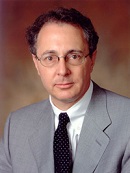 |
| Merck R&D chief Roger Perlmutter |
Merck's ($MRK) new R&D chief Roger Perlmutter sat down with a few analysts yesterday to spell out how he plans to continue to reshape the $8 billion R&D division at the pharma giant. But while one prominent critic came away with the sense that big changes are in store for Merck R&D after years of weak research productivity, another regular corporate supporter heard nothing more than a mild prescription for selectively stripping away unnecessary layers of bureaucracy while addressing a key weakness in the biologics sphere with a largely in-house pipeline strategy focusing on some key disease arenas.
Seamus Fernandez from Leerink Swann, who has been clamoring for Merck to take an ax to research and chop a billion dollars-plus out of its budget, told investors in a note that operational "de-layering" is the first step in Perlmutter's reorganization. But there's plenty more to come.
Wrote Fernandez: "He has apparently told the R&D organization that 'this is going to be major surgery' that 'will take time to recover' but (will) bring forth a stronger organization."
The previous R&D leadership team under Peter Kim emphasized process over product, Fernandez added on Perlmutter's comments, which ran the risk of running a lot of scientific projects instead of focusing on transformational product development. Perlmutter discussed the R&D strategy at a dinner at the Capital Grille steakhouse in Manhattan. And Fernandez came away with the conclusion that "we believe a major restructuring announcement within R&D (and likely the broader organization) is inevitable."
Tim Anderson's extensive note, though, came to a radically different conclusion. Perlmutter made it clear that he has nothing like a big overhaul in mind, says the Bernstein analyst. But he's also got a lot of streamlining left to do. Anderson's take:
On streamlining R&D:
Perlmutter "said one of the things he noticed upon arriving at MRK was how overly process-oriented it was," wrote Anderson, mirroring Fernandez's remarks. "He said he has been working hard to eliminate some of these unnecessary administrative layers. In terms of making structural changes along these lines, he declined to quantify how far along he is in the process, but he did say that a lot more change lay ahead. One interesting comment Perlmutter made is that it is his goal NOT to differentiate new drugs primarily on a safety angle--he would rather see efficacy as the main objective, and thinks that going down the safety route leads to too much risk aversion."
On biologics:
Look for some internal solutions, not M&A deals, to beefing up the company's biologics work. "Our prior research shows that its exposure is among the lowest and MRK confirmed this. MRK is committed to changing this, but this will be mostly an internal effort (vs M&A--primarily because not that many target companies exist). MRK said that among other reasons, a higher probability of success with biologics is a key reason for the company's interest in this area."
On the PD-1 program:
Clearly, its cancer immunotherapy program for the PD-1 drug MK-3475 remains the likeliest program to generate some much-needed market respect for R&D. Writes Anderson:
"MRK describes itself as a well-oiled machine in immuno-oncology. While MK-3475 (formerly lambrolizumab) was the predominant focus, MRK also said it has optimized leads in other checkpoint inhibitor areas apart from PD1 (but no INDs have yet been filed) without specifying what they are. MRK was asked plenty of questions about the general PD1 category, and Perlmutter described this as substantially de-risked (in line with how others have described it, given the consistency across the various companies that have presented data on their various compounds in various tumor types)." And the company "loosely" projected an application for melanoma in 2015.
MK-3475, noted Fernandez "is clearly the crown jewel." Later he states that in regards to Merck's combination therapy, "MRK's initial opportunities likely will be with either PEG-Intron or possibly on market drugs such as BMY's (OP) Yervoy, while other novel checkpoint inhibitors or co-stimulatory agents are unlikely to emerge from MRK's pipeline until 2014."
Perlmutter had a receptive audience in Anderson, who's been generally encouraging about Merck's prospects given its substantial R&D legacy--and despite the woeful record of the past 6 years. Anderson's bottom line: "MRK's discussion of this topic compels to continue believing that big R&D cuts are NOT likely to occur (in-line with our modeling.)"
Despite spending more than $8 billion, Merck has one of the weakest late-stage pipelines among the Big Pharma crowd. And it's been hit by a series of significant setbacks on leading pipeline therapies, including the FDA's recent decision to force Merck to go with a low dose of its new sleep drug suvorexant.
So far, Perlmutter has made only a few modest adjustments to R&D. Back in June, the franchise heads were being replaced by senior leaders, he told staff in a memo, who will be in charge of various phases of R&D, like early-stage research work.
"Virtually everyone has expressed frustration with our system of governance and the complexity of our organizational design," Dr. Perlmutter wrote in the memo, according to The Wall Street Journal. Perlmutter said he regretted that the changes "resulted in the elimination of several senior positions."
Perlmutter, who had a record of striking several high-profile partnerships while running the research ship at Amgen ($AMGN), appears to be sticking with a simple game plan, if Anderson has it right: Cut back where possible, but leave the big axe alone; focus on the pipeline; and beef up the work on biologics in several key areas while keeping faith in its immunotherapy efforts. It will be interesting to see whether the market and CEO Ken Frazier will oblige with that patient strategy.
A Merck spokesperson did not immediately respond to a query from FierceBiotech asking for some clarity on the R&D reorganization.
Special Report: Tim Anderson - The 25 most influential people in biopharma today - 2012